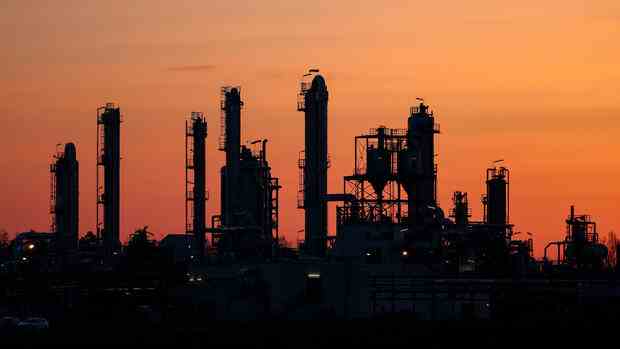The high energy prices are causing problems for the industry.
(Photo: dpa)
Frankfurt According to the industry association VCI, the prospects for the chemical industry in Germany have continued to deteriorate in recent months. Association President Markus Steilemann drew a correspondingly bleak picture at the annual press conference: “The situation is dramatic. The enormous energy prices, but also the price increases for raw materials and preliminary products are making life difficult for our country’s industrial base,” said Steilemann.
The VCI President warned that the companies in the industry would probably not be relieved of the planned electricity and gas price brakes, if at all. The regulations would deviate too much from the original proposals of the Gas Commission. “Our medium-sized companies in particular are fighting for their future,” says Steilemann, who is the head of the Leverkusen-based plastics group Covestro in his main job.
This is clearly reflected in the development of earnings. Around 80 percent of the member companies of the VCI are now reporting declining earnings, and 40 percent of the chemical companies are already operating at a loss.
Medium-sized companies in the industry are disproportionately affected. Because while the highly globalized large corporations such as BASF or Covestro can cushion some of the problems with their strong presence in North America and Asia, the medium-sized companies are much more dependent on their German production sites.
Top jobs of the day
Find the best jobs now and
be notified by email.
Ultimately, the future of chemistry as the third largest German industrial sector is at stake. “It can only survive in the long run if it has enough gas as a raw material for the manufacture of its products and enough cheap electricity to operate its systems.”
Industrial demand weakens
The difficult situation for the industry results on the one hand from the drastic increase in energy costs. The high prices are forcing a number of companies to shut down particularly energy-intensive production facilities such as ammonia production. According to the VCI, there are already supply bottlenecks for individual raw materials.
>> Also read: Lure call from America: German chemical and pharmaceutical companies are drawn to the USA
On the other hand, demand is now also declining, with important customer sectors preferring to reduce their inventories. According to the VCI, large parts of the economy are already in recession. Two thirds of chemical companies complain about a lack of orders. And demand from industry will probably continue to fall.
The VCI has therefore further reduced its forecast for the development of the industry for the year as a whole. Due to price factors, sales in the industry are likely to increase by 17.5 percent to 266 billion euros. At the same time, according to the latest estimate, production in the chemical-pharmaceutical industry will shrink by six percent for the year as a whole. Previously, a decline of 5.5 percent had been assumed.
Excluding the pharmaceutical industry, which is still growing, pure chemical production is likely to fall by ten percent (compared to a previously expected minus of 8.5 percent). The industry recorded heavy production losses of 15 percent, especially for energy-intensive petrochemicals. According to the VCI, the production of inorganic raw materials and plastics has already shrunk by nine percent each. According to estimates by the association, capacity utilization is now just under 80 percent.
Production will continue to fall in 2023
For 2023, the chemical companies expect another sharp decline in production, according to Steilemann. Sales are also expected to fall. “We therefore do not believe in a Happy New Year. The starting position is extremely unfavourable. In summary, a bleak picture emerges. Production is severely curtailed, capacities are not fully utilized.”
Against this background, Steilemann sharply criticized politics. The government’s support measures are not reaching many companies in the industry. The Gas Commission’s proposals to make 70 percent of their gas consumption available to companies at seven cents per kilowatt hour were promising. However, the government did not keep its promises and instead implemented the framework for state aid with a view to Brussels, and further tightening was ensured in the parliamentary procedure.
Specifically, the VCI President criticizes, among other things, that the specified funding ceilings for bulk consumers are far too low and that all companies are forced to build up reserves if their operating profit does not fall by at least 40 percent.
>> Read about this: Economics Minister Habeck wants to help the industry with billions in the transformation
This is associated with such great uncertainties that companies are reluctant to take advantage of funding. This in turn will contribute to the fact that the companies will probably significantly reduce their investments in the coming year.
The industry association also criticizes the new planned EU regulations in the chemical sector. Steilemann refers to a further 51 new legislative proposals by the EU Commission, while 116 proposals from previous years are still pending. “The already ailing companies can expect a real regulatory and bureaucratic tornado.”
Instead of creating incentives for innovation and investment, getting rapid planning and approval procedures off the ground and pushing ahead with the massive expansion of renewable energies, legislative micromanagement is being practiced.
More: This medium-sized company defies the crisis – and invests in self-sufficient energy supply

